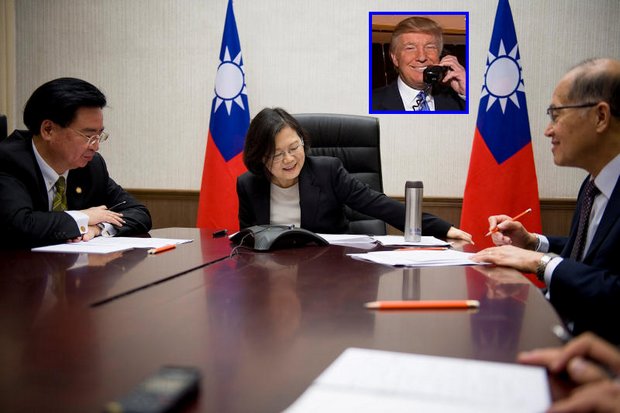
US President-elect Donald Trump's taking a phone call from Taiwan President Tsai Ing-wen broke the almost four-decade precedent of no direct high-level contact between the US and Taiwan, and it seemed everyone had something to say about it.
The international news media went into a tizzy speculating on China's reaction, frequently repeating the standard Chinese propaganda line on Taiwan in the process.
Many on the American left are already hand-wringing at this 10-minute conversation, calling it "risky" and "provocative". It seems to stand in contrast to the recent praise of President Barack Obama for breaking diplomatic precedent in Cuba.
Some supporters of Taiwan, however, are ecstatic, calling the call a "major breakthrough" in US-Taiwan relations. Others questioned Mr Trump's abilities. A typical comment from the internet: "More likely is that he doesn't fully understand cross-strait relations, and is completely unaware of what he's just done."
So what does this portend for US-Taiwan-China relations under the coming Trump administration? Let's start with Mr Trump. Anyone who thinks they understand what he is up to is delusional, other than he's up to his old tricks. The only certainty is that Mr Trump is following his standard practice of doing what people don't expect.
He did this masterfully during the election campaign, repeatedly breaking convention and launching asymmetrical attacks to destabilise and confuse his opponents. He has continued to do it since. Many of his political opponents continue to underestimate this very crafty man. We can't be sure who Mr Trump was sending a message to, or even what that message was. We can be sure it was deliberate, and while it is doubtful he has a detailed knowledge of Taiwan's situation at a granular level, he certainly does have some idea of the bigger picture.
Was it simply a continuation of his message to the American people that he does things differently? Was he signalling to the domestic diplomatic corps and the military that he is going to fundamentally alter the way things are done? Was it perhaps a signal to China he's not going to let Beijing's constant outrage machine and "hurting the feelings of the Chinese people" influence him?
Other possibilities: he was signalling a more robust pro-Taiwan approach, or eyeing a boost in military hardware sales to Taiwan to improve the US economy. Is Mr Trump taking a stronger approach to China diplomatically, and setting up Taiwan as a bargaining chip for negotiations further down the line (and potentially selling out Taiwan to get something he wants)?
We don't know if it is one of these, several or all of these at once -- or perhaps even none. That's the way he wants it; it's his modus operandi. For President Tsai, it was a stroke of brilliance and a major domestic coup to call Mr Trump. It begs the very interesting question of who was the intermediary who arranged it. It had to be someone able to get into the Trump inner circle, and whoever it is would be someone to keep a close eye on going forward.
For Taiwan those 10 minutes accomplished quite a bit. It signalled Ms Tsai is proactive and determined to raise Taiwan's visibility on the international stage, which she certainly accomplished.
The issue of Taiwan's unusual geopolitical position and China's bullying behaviour towards Taiwan was raised and made extremely visible internationally. It set a precedent for other high-ranking US officials to talk to Taiwan, and opens the door for those in other countries to do so in the way that doors have been opened for visits by the Dalai Lama in spite of protestations by China.
Key American players to keep an eye on for their response include both the American military and diplomatic establishments, both of which have already been strengthening or eyeing improving higher-level ties with Taipei.
Also watch Japan and the European Union, both of which could find good advantage in cosying up to Ms Tsai. It could also end up strengthening her hand in Southeast Asia and her "New Southbound Policy" if enough countries around the world start to improve higher-level ties with Taiwan.
Domestically in Taiwan, this breakthrough could be very significant. Ms Tsai showed boldness, skill and insight in a government recently widely panned for vacillating on many issues and sinking in the polls.
Depending on how things play out from here, it could end up being the start of the biggest breakthrough in Taiwan's diplomatic situation in decades. That would be a huge boon for the president and her party and, if successful, also a major psychological boost to the people of a nation long marginalised.
That would be consequential for a party swept into power on a growing Taiwanese identity.
There is some room for optimism here. The president made her name as a skilled trade negotiator, so any doors opened internationally by this phone call offer her an opportunity to use her talents to maximum effect.
No matter how big this turns out, this one breakthrough further turns the screws on the flailing Kuomintang Party and its chair Hung Hsiu-chu, bound to her already unpopular China-centric policies.
This article originally appeared at the website of The News Lens International.
Other top articles at The News Lens include Does Trump Spell the End for Kissinger’s China-U.S. Strategy? and an analysis of Fears for Cross-Strait Economic Backlash after Trump-Tsai Phone Call.
